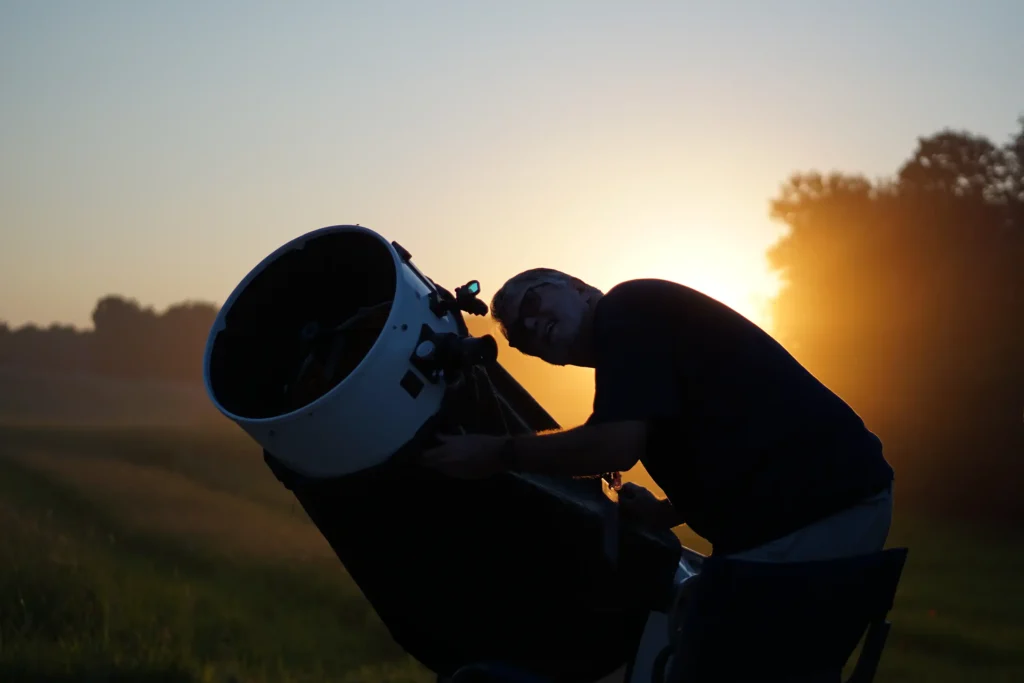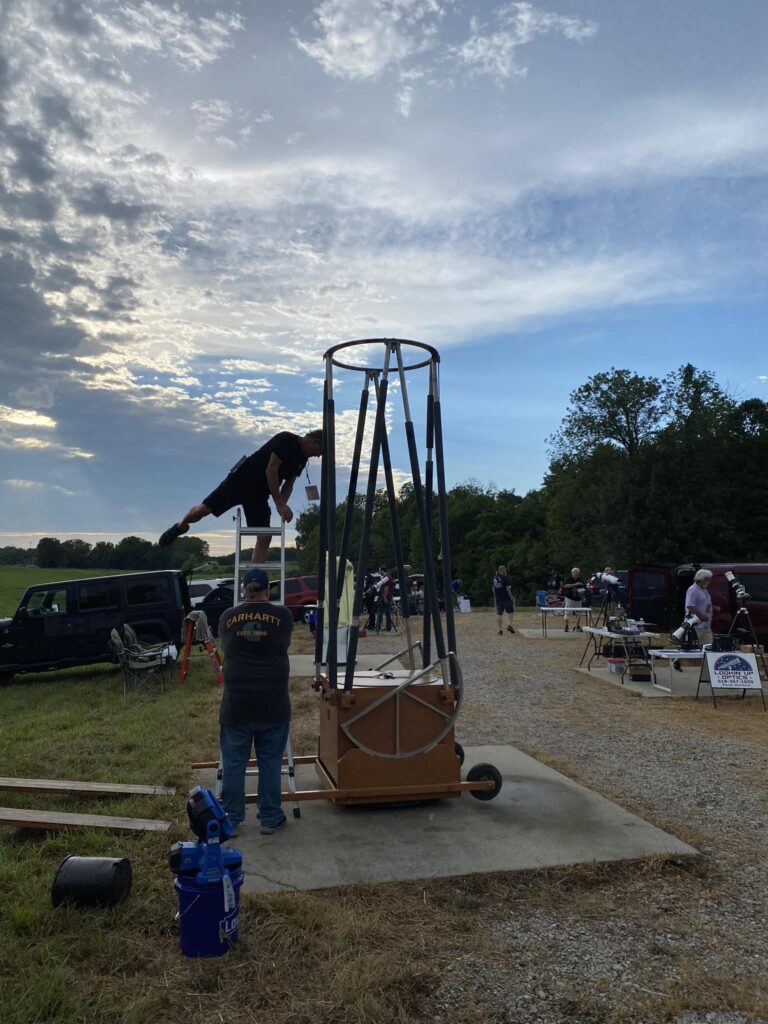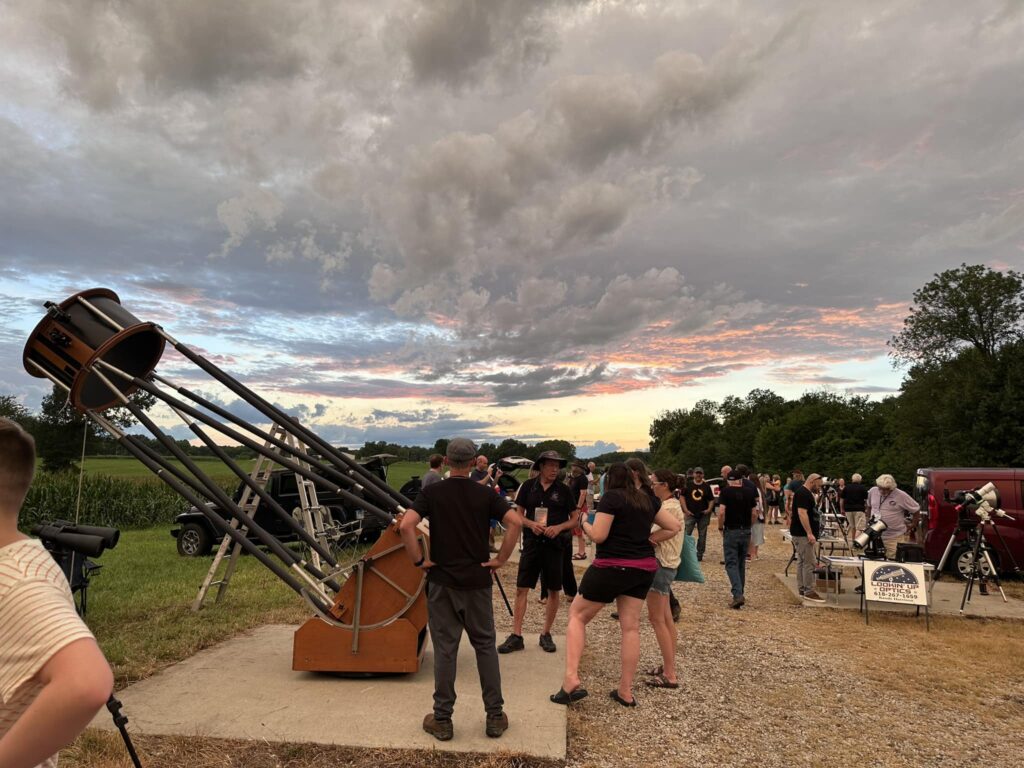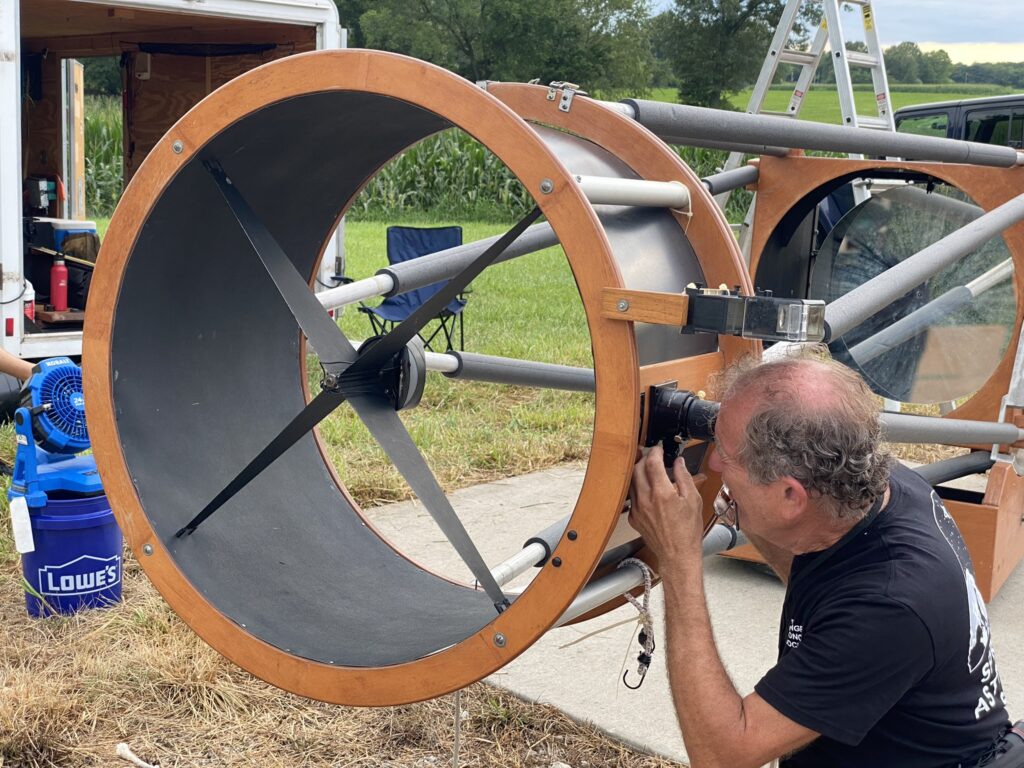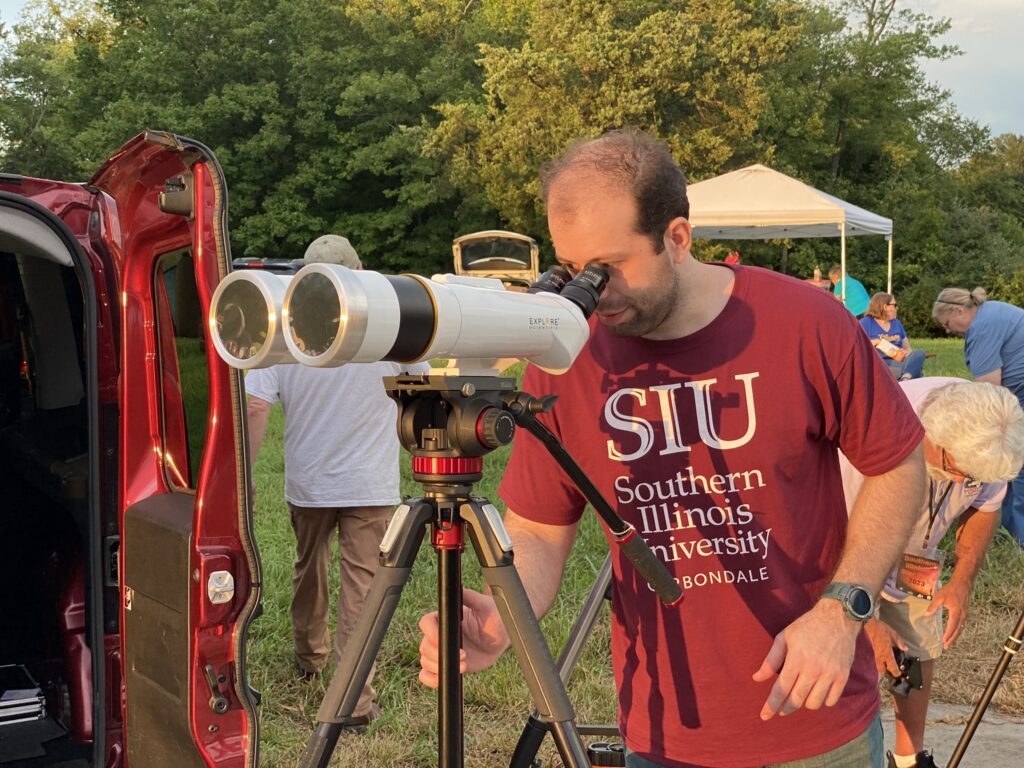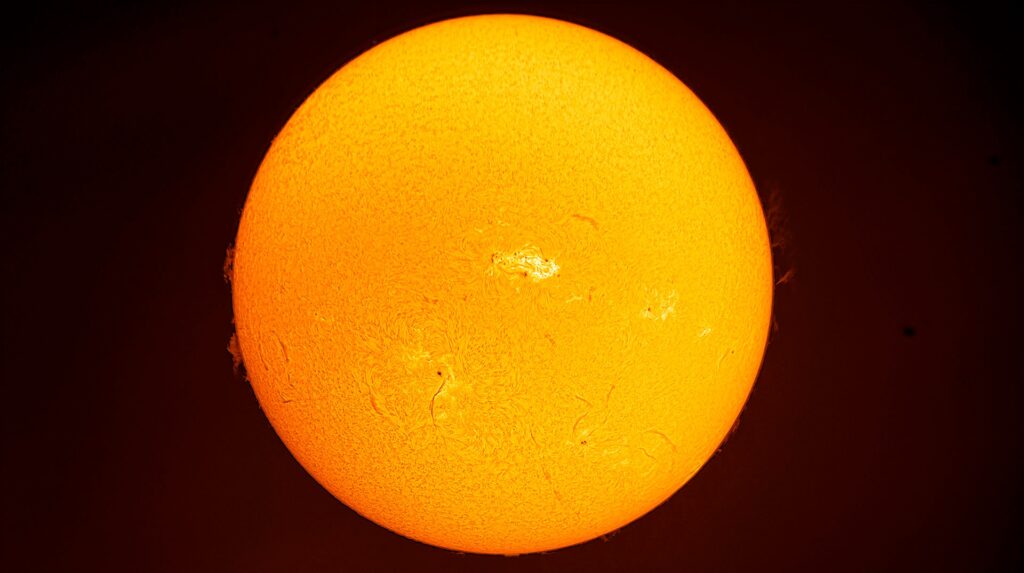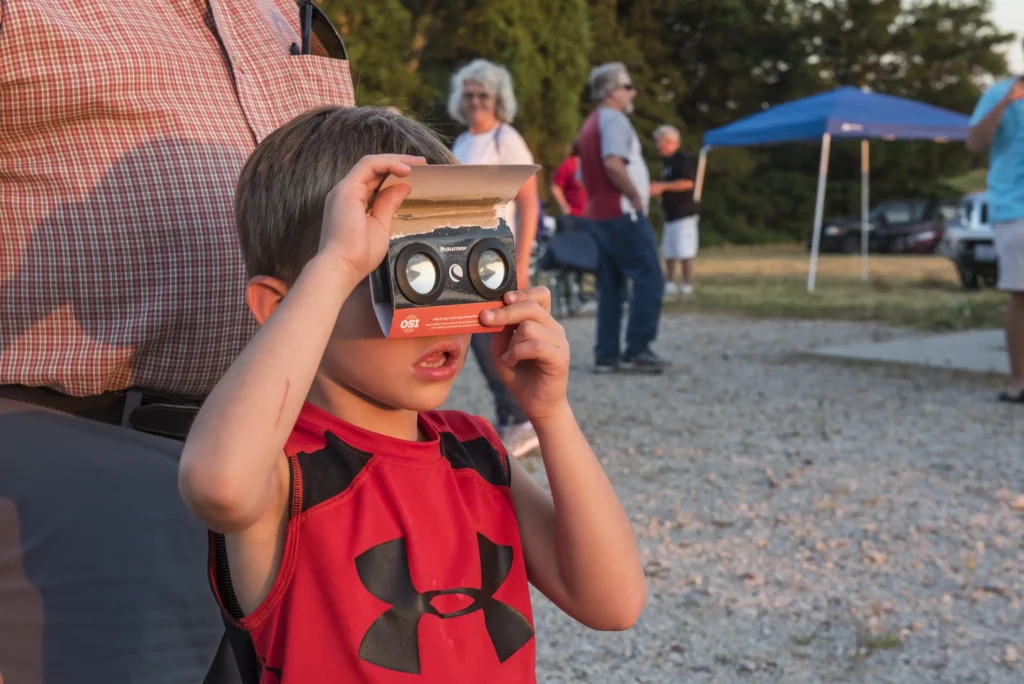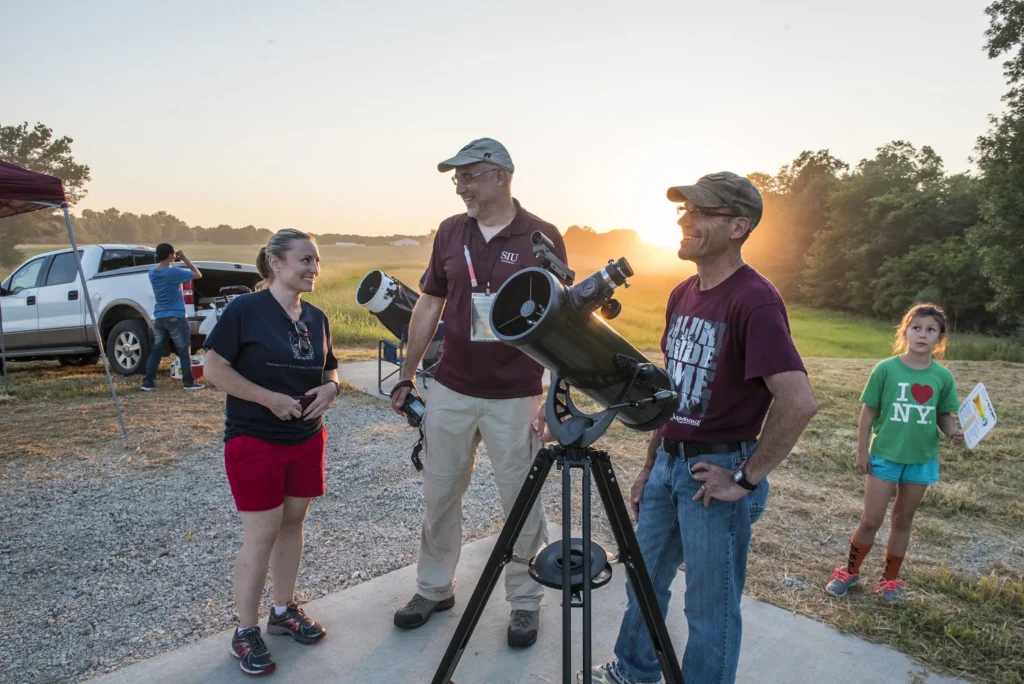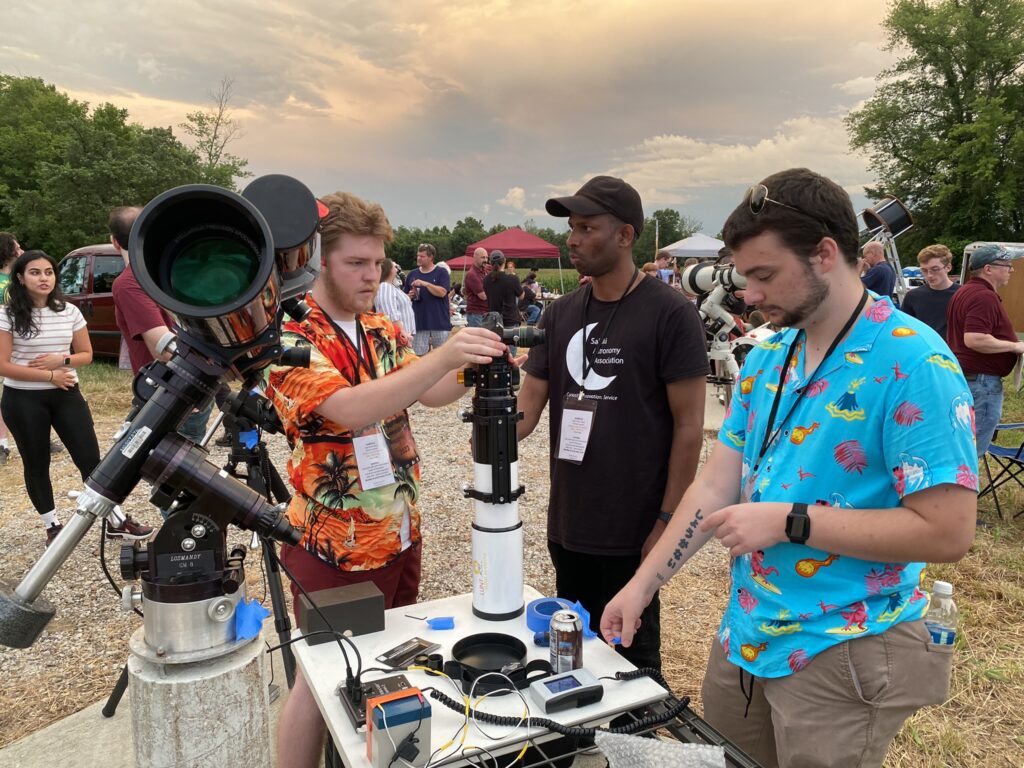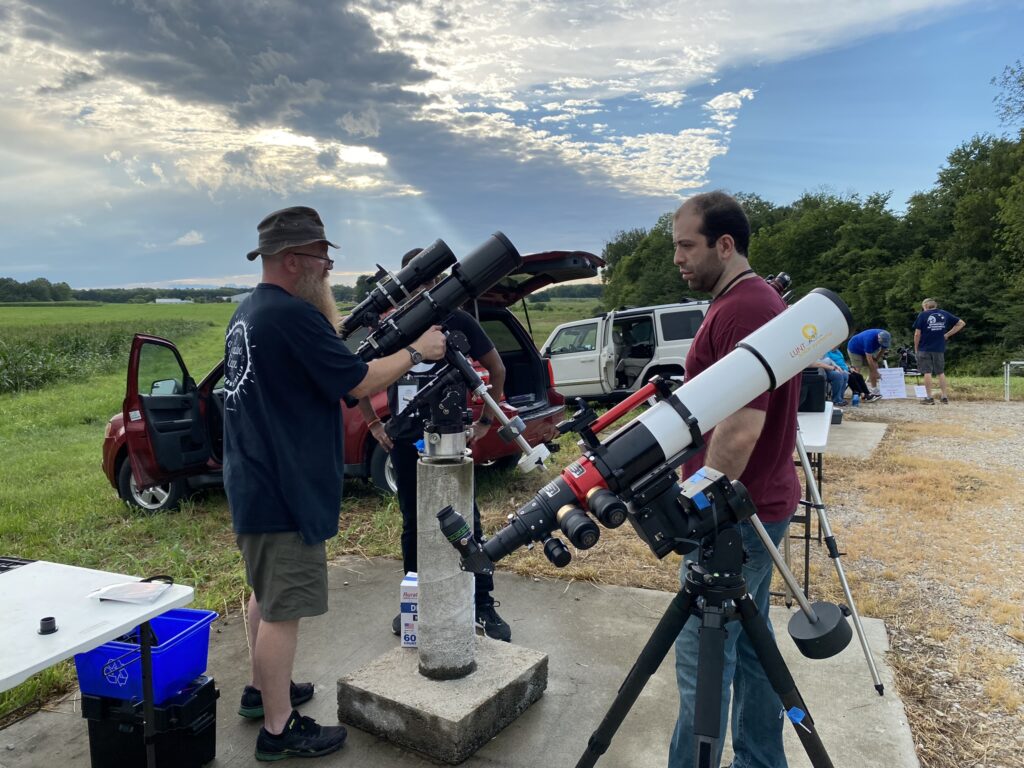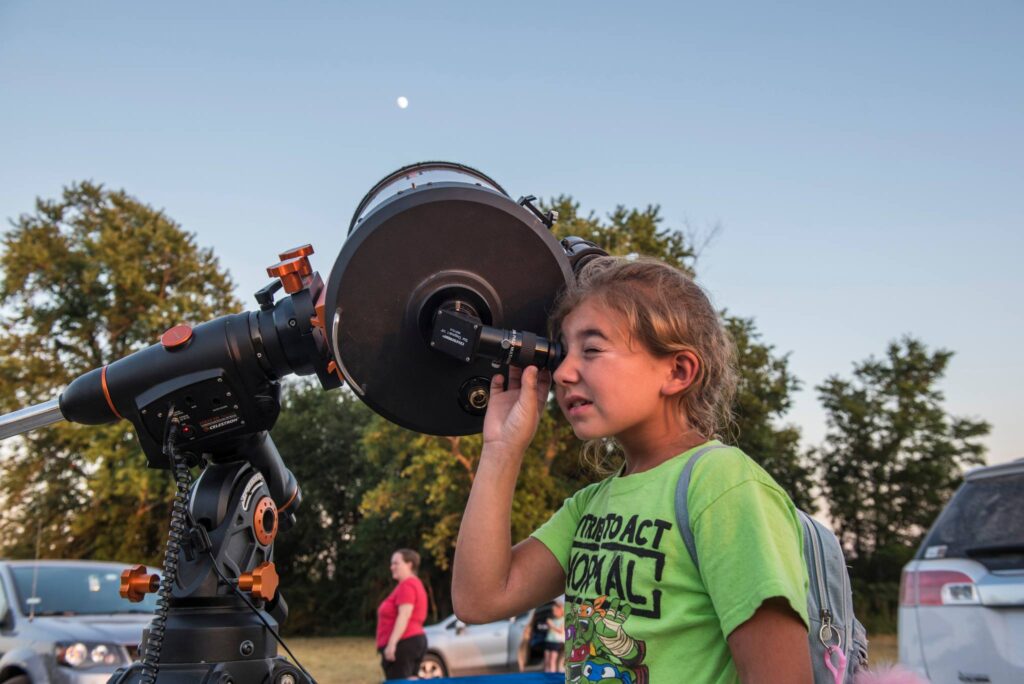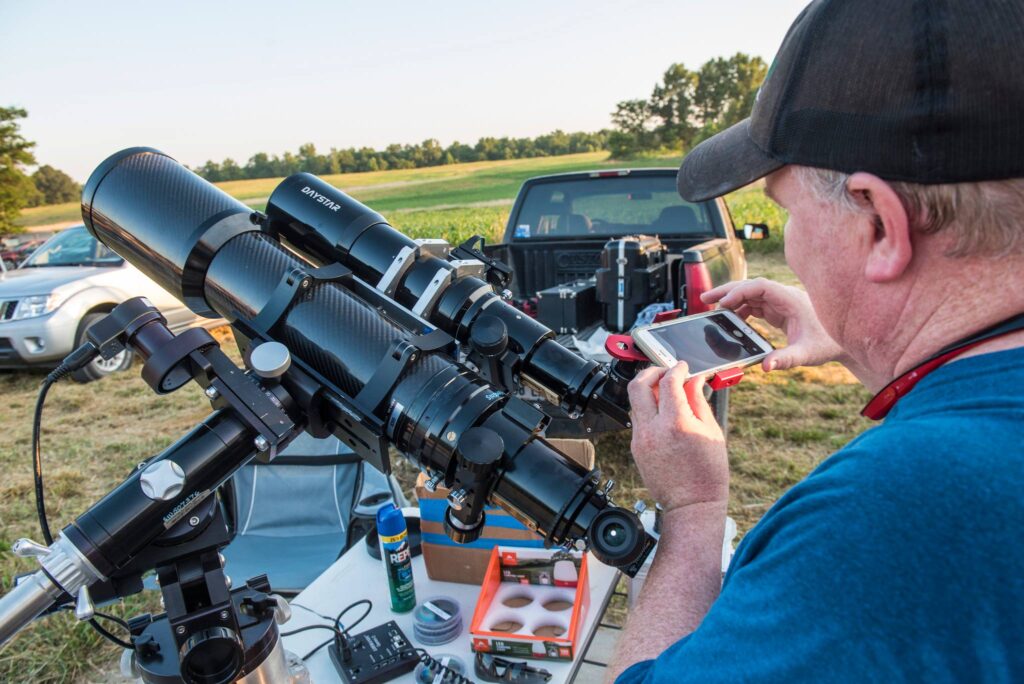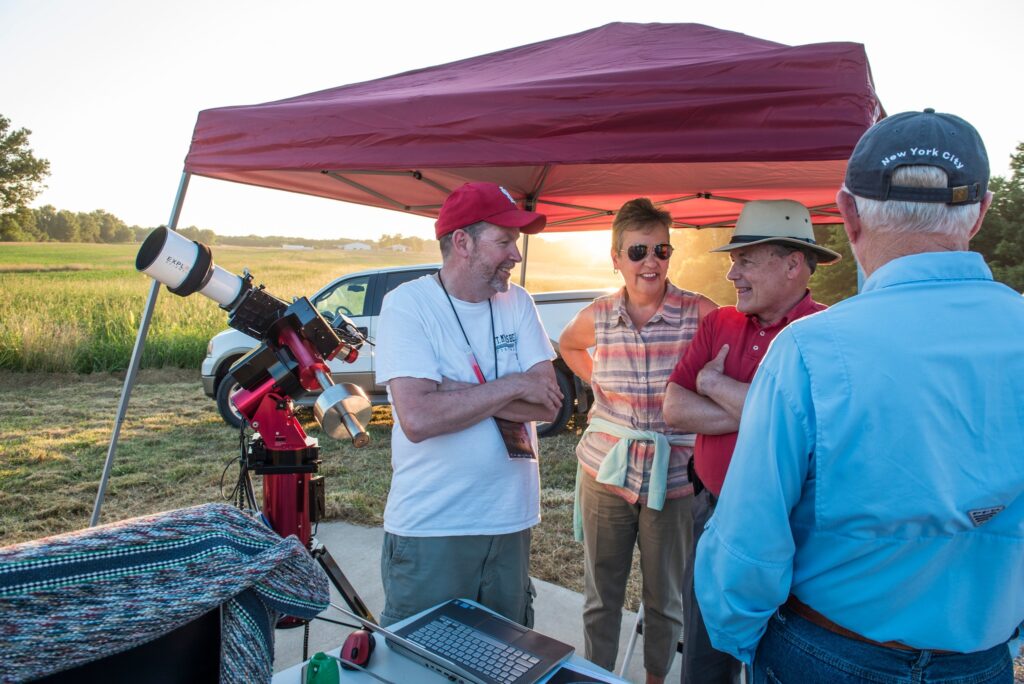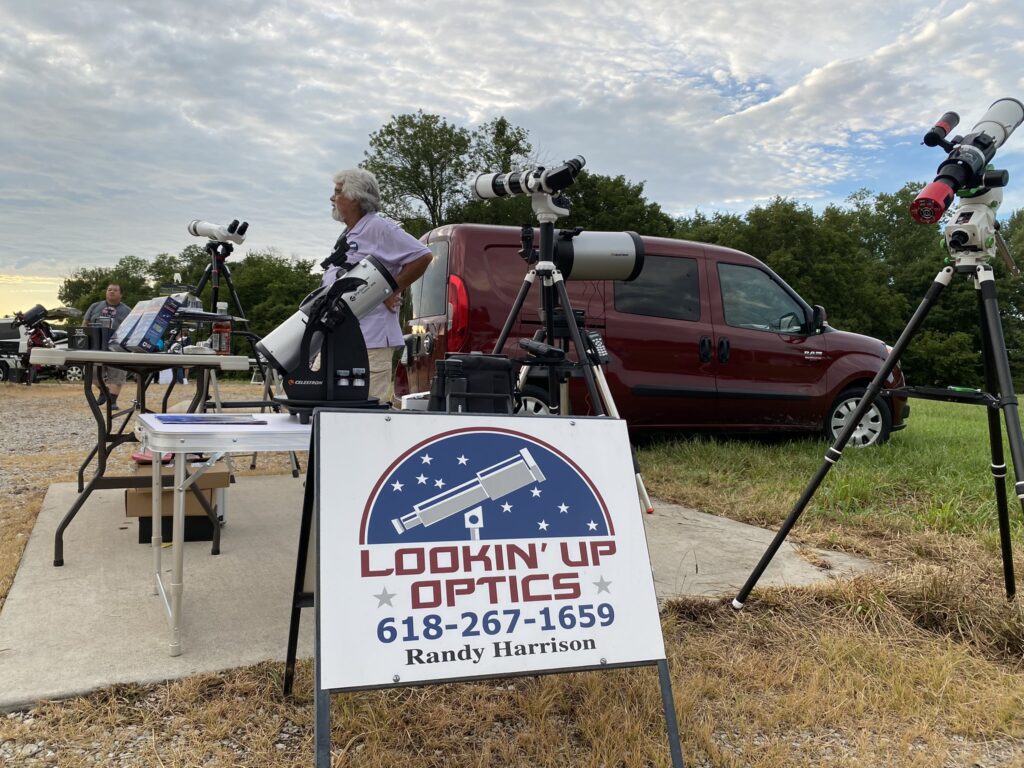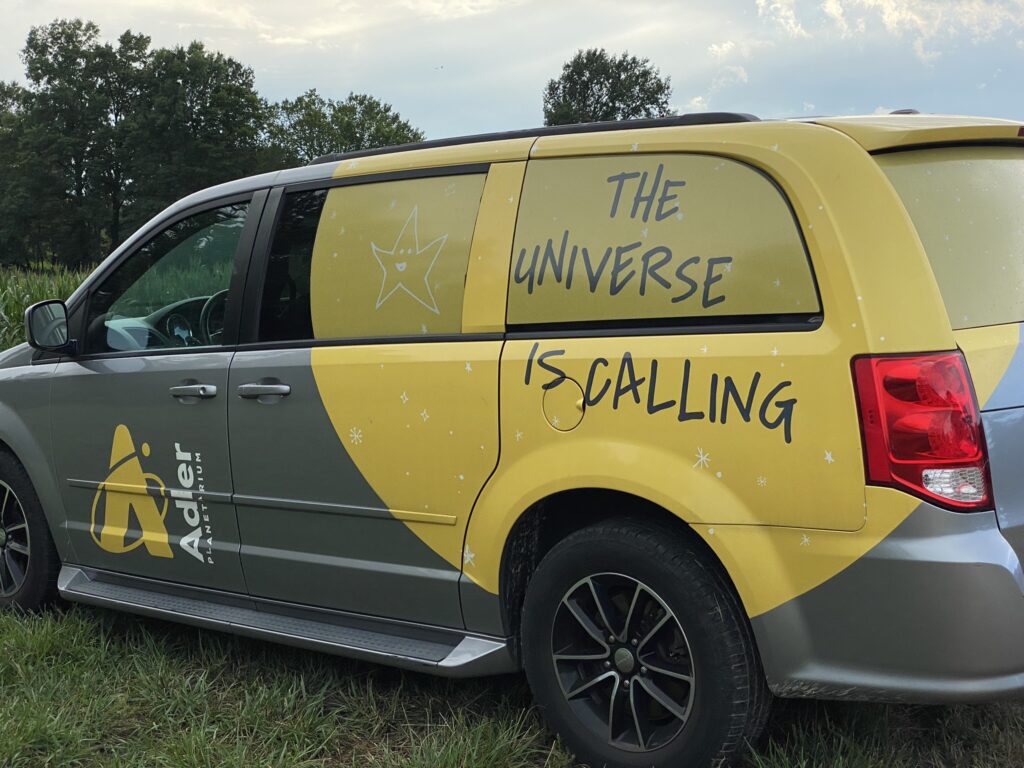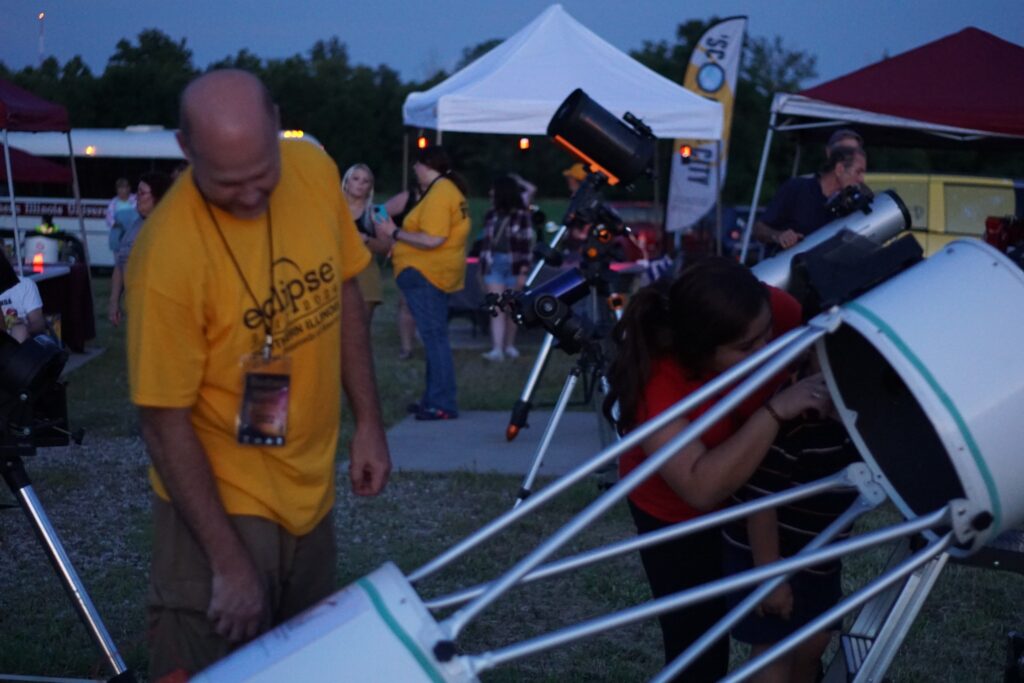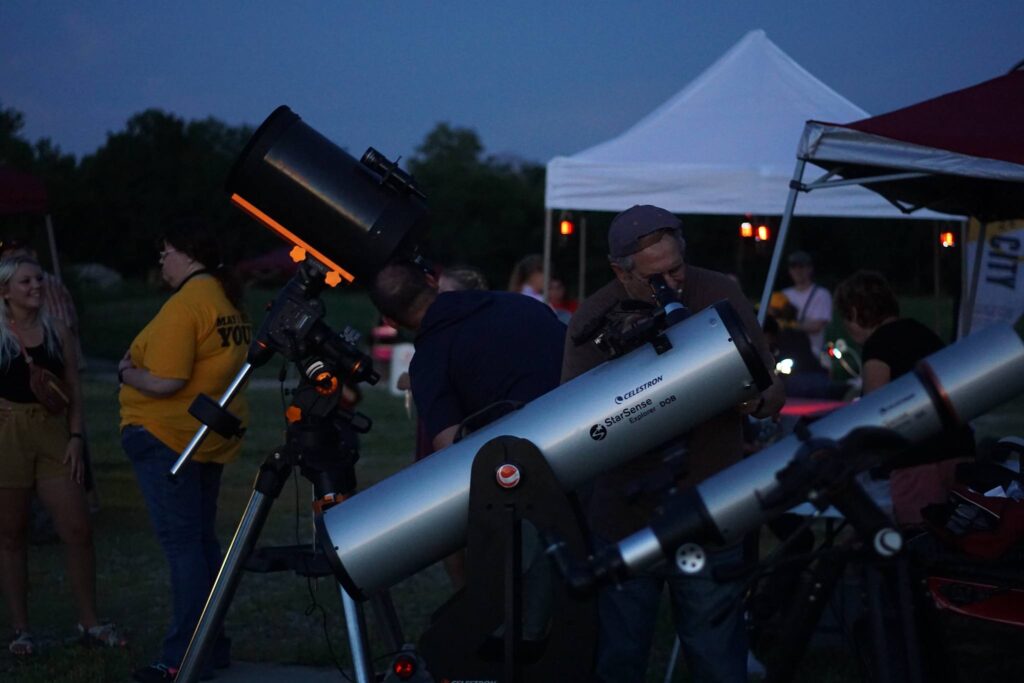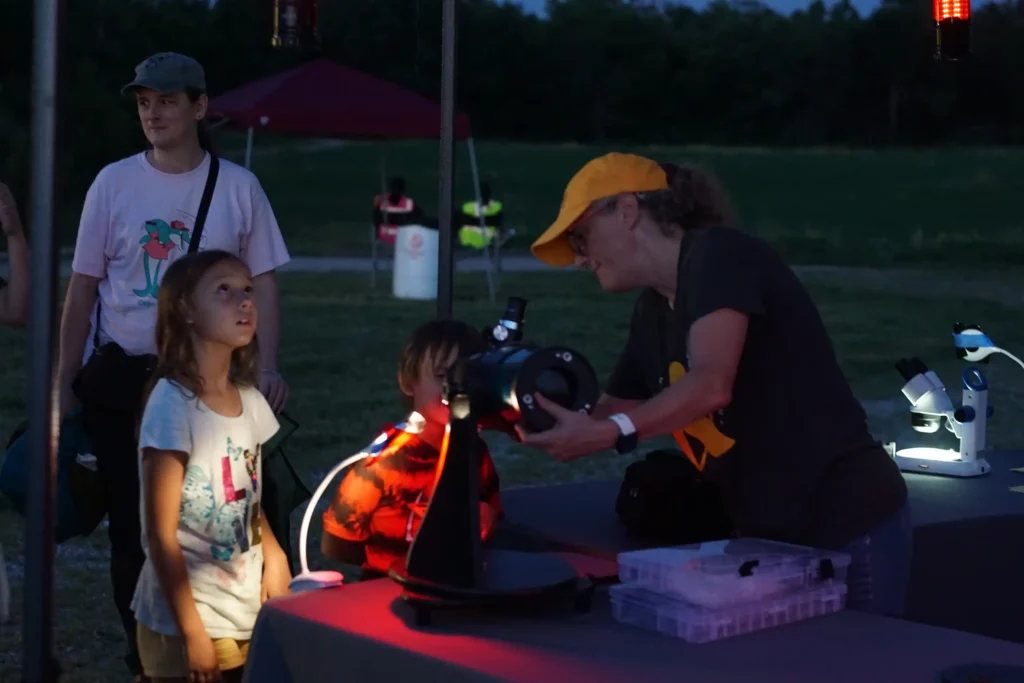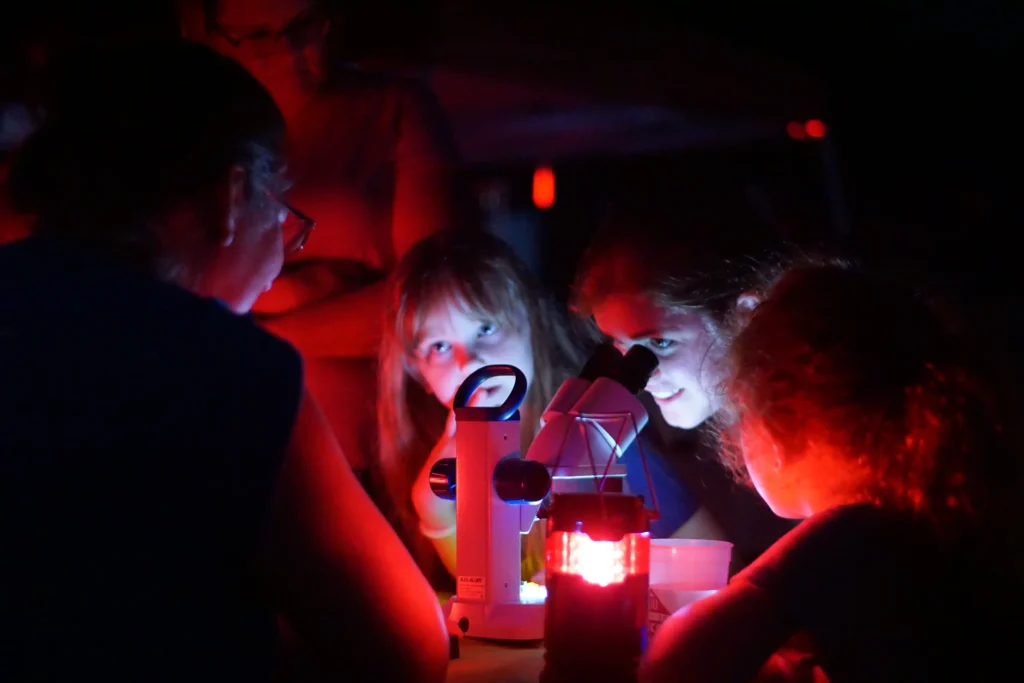Southern Illinois Star Party 2025
FREE Public astronomy observation and science activities at the SIU Carbondale University Farms Astronomy Observation Area
Saturday, September 27, 2025
5pm to 11pm CDT
Join SIU Carbondale, and the Astronomical Association of Southern Illinois for a free night of guided telescope observations as well as family friendly astronomy and science activities. Enjoy an evening under the stars at the SIU University Farms Astronomy Observation Area. The site is 2 miles west of SIU’s main campus in a semi-dark area that offers good views of the night sky.
Several night time and solar telescopes operated by amateur astronomers and SIU School of Physics and Applied Physics faculty, staff, and students will be available to the public this evening. Visitors will be able to see the Sun, Moon, Venus, Saturn, Jupiter and other celestial objects.
Visitors are welcome to bring their own lawn chairs and blankets as well as photography or telescope equipment. Free shuttles will run from SIU Parking lot #63 at the corner of Oakland and Chautauqua streets throughout the evening. Parking at the SIU Farms observation site is very limited and available by permit only.
For disability accommodations call 618-453-5738. Disabled visitors or those bringing telescope equipment that would be difficult to transport by shuttle may contact events@siu.edu or call SIU Events and Outreach at 618-453-7751 for a free onsite parking permit.
Free Admission & Family Friendly
Guided Telescope Observations
A variety of small and large telescopes will be setup for public viewing.
Astronomy & Science Activities
Learn about the Sun, our night sky, telescopes, astrophotography and current NASA sponsored research at SIU. Presentations on the night sky will take place at the top of every hour after sunset. Make sure to checkout the Science Center and Straight Up Solar demonstration areas at the star party.
Additional presentations and movies to be shown on the inflatable projection screen to be announced
Free Parking & Shuttle Service
Located at SIU campus lot #63 on the corner of Chautauqua and Oakland streets in Carbondale. Shuttle pickup every 15 minutes. In addition, a limited number of onsite parking permits will be available.
Concessions Available
Vendors TBA.
For special accommodations and more information contact SIU Events and Outreach at 618-536-7751 or email events@siu.edu.
No registration or tickets required attend this event.
No outside alcohol is permitted at this venue. Southern Illinois University is a smoke free campus.
Note that you will likely be in close proximity to people throughout the evening. If you are feeling sick, please stay home.
Portions of this event will be photographed, videoed and live streamed.
Details of celestial objects we’ll be looking at this evening.
Safe solar viewing is possible through special filtered white light, Calcium-K and Hydrogen-Alpha solar scopes until sunset at 6:46pm. The filtered telescope allow us to observe solar activity such as prominences and sunspots.
The planets Venus and Mercury will be difficult to spot this evening due to their proximity to the Sun. Check out the telescopes to see if Venus is visible prior to sunset and look for Mercury just after sunset.
The Moon will be be 30% illuminated this evening. It will be visible throughout the first half of the event, setting at 9:43pm. This crescent Moon will offer excellent viewing of the lunar surface as light casts shadows across craters and other features. This Look for scopes with cell phone adapters at the event so you can get your own pic of the Moon.
Saturn and it’s largest moon, Titan, will be visible this evening as well as Mars and Neptune. Checkout Mars before it sets at 8pm. Although Neptune is much larger than the Earth, it is also very far away from us making it dim and difficult to spot. Look for it though a larger telescope in the region of the sky close to Saturn.
Several stars and deep sky objects such as M13 (Hercules Globular Cluster), M57 (Ring Nebula), M31 (Andromeda galaxy) will be visible this evening. The relatively dim Moon this evening contributes to good viewing of these, “faint fuzzies,” especially as the Moon gets lower on the horizon and sets just before 10pm. Viewed though the eyepiece of a portable telescope, these distant objects appear as faint monochrome images. Checkout the astrophotography setups throughout the evening to see detailed images of deep sky objects that are created using long exposures and image stacking techniques.
Fun educational activities.
Do you like learning about space science in fun and engaging ways? We are planning several activities for the evening that we know you’ll enjoy.
Bring a blanket or lawn chair to relax and enjoy a variety of presentations, media, and trivia questions on the 25′ inflatable screen on the edge of the observation area throughout the evening. After 9pm, we will be switching over to only night vision friendly imagery such as black and red images or planetarium imagery through Stellarium in night vision mode. This is done to make for the best possible experience for visitors looking through visual scopes once it gets really dark.
Telescopes at the event will be looking at a range of objects. During the day, telescopes and binoculars with special solar filters will observe the sun in various wavelengths. Most smaller scopes at night will concentrate on the planets or the Moon after dark. Check out how the different scopes look and work and ask the volunteers about what you’re looking at. Medium sized scopes may shift over to look at dimmer deep sky objects. AASI’s large 16″ and the massive 10′ tall – 30″ Obsession reflecting telescope will allow you to see the faintest deep sky objects. Look for telescopes with cell phone adapters to take your own pic of the Moon.
Meteorite or meteor wrong? Learn about the composition of meteorites and see if you can pick out the meteor among earth rocks in this educational activity and check out more activities throughout the event.
Learn about solar power at the Straight Up Solar activity area. Check out solar panels and a few applications such as a solar powered water pump. This hands on activity lets you immediately see how light is converted into electrical power and observe how solar power output is effected by a passing cloud or the orientation of the solar panel.
Learn about astrophotography or camera assisted astronomy at a few of the telescope pads tonight. Look for small computerized telescopes such as the See Star that output imagery directly to a phone or larger professional astrophotography setups with laptops or larger monitors. Throughout the night, telescope operators will talk about the process they use to acquire and stack images to produce images with much greater detail than you can see in an eyepiece.
Check out different types of telescopes and the most recent innovations in amateur astronomy equipment at the Lookin’ Up Optics area. Owner Randy Harrison will demonstrate and explain the different types of telescopes and the best way to get started in observing the night sky.
Check out the 4.5″ reflecting telescope used by the International Library Telescope Pogram. Visit the info tent to see the standard telescope that is in over 1,100 libraries in the US and around the world. These great little scopes are ruggedized by AASI volunteers and available for checkout at several area libraries.
Presentations on the night sky by astronomers throughout the evening will take place in small groups and on the big screen.
SolarSTEAM National Star Party
Can’t make it to the event in person? The Southern Illinois Star Party is the anchor location for the SolarSTEAM National Star Party, a hybrid event that brings the nation together to share in the journey of NASA Heliophyics on their mission to study the nature of the Sun, and how it influences the very nature of space – and, in turn, the atmospheres of our planets and technology. For more information go to: SolarSTEAM.siu.edu
Join us on Facebook
For more information and discussion about the event, please visit the Southern Illinois Star Party Facebook event site.
Frequently Asked Questions
What groups are involved in the star party?
The Southern Illinois Star Party is hosted by SIU Carbondale as a joint event that involves several campus units organized through the SIU STEM Education Research Center and the SIU School of Physics as well as the Astronomical Association of Southern Illinois (AASI). Beginning in 2024, the star party is the anchor location for a nation-wide star party organized by NASA SolarSTEAM broadcast via YouTube Live.
What type of activities are at the star party?
The star party will include several telescopes operated by volunteers giving you views of the Sun, planets and other celestial objects. Most of the telescopes are visual (with eyepieces) while some are camera assisted and will display imagery on computer screens or a cell phone. Volunteers at each telescope will explain what you are looking at. Throughout the evening there will be a mix of small and large group presentations and demonstrations as well as content displayed throughout the night on an inflatable big screen.
What if I can't attend in person, is there an online way to participate?
The Southern Illinois Star Party is the anchor location for the NASA SolarSTEAM nation wide star party which includes a live broadcast on the @NASASolarSTEAM YouTube channel. You can tune in throughout the night for special content produced live from SIU Carbondale and participate in discussion online.
Parking
The best option for most visitors is to park at SIU lot #63 and ride a free shuttle to the observation area. Shuttles run every 15 minutes and help us to keep white light at the site and dust from the road at a minimum. Limited parking onsite is available for handicap visitors, media, or attendees bringing telescope or photography equipment that would be difficult to transport via the free shuttle. Parking permits are required for the area and can be requested through University Events at (618)-453-7751 or email events@siu.edu.
Are white lights allowed at the observation site?
You will notice that most of the volunteers at the star party will use red lights after dark in order to keep light pollution at a minimum and enhance the experience for everyone. White lights are only used in areas where we absolutely need them. Visitors are encouraged to use red lights when necessary at the site.
What can I bring to the star party?
Visitors are allowed to bring food and non alcoholic drinks as well as chairs, blankets and observation or photographic equipment. Concessions are available onsite. The astronomy observation area is part of SIUC’s smoke free campus.
Are pets allowed?
No pets other than service animals are allowed at the star party.
Can I bring a large group to the event?
Large groups should contact SIU Events in advance at (618)-536-7751 or email events@siu.edu
Is there a rain date for the event?
All in person activities at the star party are weather permitting and there is no rain date.
What types of telescopes are at the event?
All telescopes at the event are portable amateur astronomer telescopes or binoculars. Expect a range of telescopes including 40mm to 140mm refactors that offer incredibly sharp images and a variety of reflectors including Newtonians, large Dobs, and compact Schmidt-Cassegrain scopes. The largest telescopes at the event are the 16″ and 30″ visual Dobsonian telescopes owned by AASI. These scopes offer the best eyepiece views of deep sky objects. A few telescope setups are specialized for astrophotography and will allow visitors to see stacked images of deep sky objects in great detail. Note that most of the telescopes are owned by volunteers who are sharing their passion of astronomy with visitors this evening.
Are there other public astronomy observations in the area?
SIU Public Astronomy Observations are hosted monthly by SIU Physics and the Astronomical Association of Southern Illinois (AASI) at the Neckers Astronomy Observation Deck on the SIUC campus during the fall and spring semesters. Additionally, SIU, the Adler Planetarium of Chicago and AASI host other special observations throughout the year. Special observatsions are advertised on the hosting venue websites and social media.
Is this an annual event?
The Southern Illinois Star Party is an annual event hosted at SIU Carbondale. The first star party was hosted at the SIU Farms in 2018 following and was attended by just over 500 people.
How many people attend the event?
Star Party attendance has been as high as 550 people and as low as 250. Most people attend the event for an hour or more taking the shuttle to and from the event.
Are there activities for handicap or special needs visitors?
Most of the activities at the star party are accessible to all visitors with a few exceptions. The level of the eyepieces on some scopes may be out of reach of some visitors and require stools or step ladders to reach, however camera assisted viewing is available on some telescopes that allow visualization on computer screens. Visitors with mobility issues or in need of special accommodations should contact SIU Events and Outreach at 618-536-7751 or email events@siu.edu. A limited number of parking permits for grass parking adjacent to the gravel and concrete observation area are available.
Are there activities for children?
The Southern Illinois Star Party includes hands on activities for all ages. Children accompanied by adults are encouraged to check out the different views from the telescopes and most telescope have step stools or ladders allowing children to reach eyepieces.
Are there sponsorship opportunities?
Businesses or individuals wishing to sponsor the star party or similar community outreach events at SIU should contact SIU Events and Outreach at 618-536-7751 or email events@siu.edu.
All activities are weather permitting.
For questions or more information, contact University Events and Outreach at: (618)-536-7751 or email events@siu.edu.
Thank you to our event partners and sponsors

